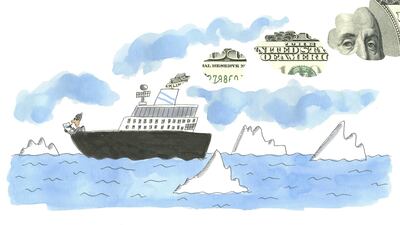Gary Clement – the wonderful illustrator of this column– look away now. Buying experiences, as opposed to buying stuff, doesn’t make you happier. Sorry.
Gary is on a cruise to the top of the world. He’s sailing through Greenland as I write. Lucky thing. It’s a once in a lifetime type trip and costs a small fortune.
But instead of lamenting the money spent, he and his fellow cruisepatriot is onto the right thing: spending makes you happy. It doesn’t matter whether it’s on material goods or experiences. Yes, it’s official, because a Hungarian study says so. And if you think about it, it makes sense: when you buy a "something" you have an experience, a memory. It could be how you feel when wearing those shoes that you’ve coveted, or the rush of jumping out of a plane. Different people, different touchpoints as the marketing folk say.
Gary’s sensory stimulation and happiness in iceberg-watching is probably equivalent to the joy another person gets from parachuting. You can follow his progress via his tweets @garyjoelclement.
"But wait, I’m confused", you think. "Nima, you’ve been telling us to stop spending on stuff, and think of going places and doing more with less. This doesn’t make sense."
Yes, I stand corrected but not entirely. Read on to find out what I mean.
First the conflict: the marketing universe has been screaming the "buy experiences, not things" message. They’ve been riding the wave of findings that have popularised this concept. Key to this is Thomas Gilovich, the Cornell University psychology professor. He has been studying money and happiness for over two decades and is the person behind research that brought about the "buy experiences" headlines that we’ve seen splashed across motorway banners – usually flogging us a credit card with extortionate APR.
This is how Mr Gilovich puts it: “You can really like your material stuff. You can even think that part of your identity is connected to those things, but nonetheless they remain separate from you. In contrast, your experiences really are part of you.”
But, Mr Gilovich, there is a ripple in that happy pool and it’s getting bigger.
_________________
Read more from Nima Abu Wardeh:
How to create the ultimate lazy person's portfolio
The rally against cash might not be in our best interests
Could you live without spending for a year?
Ten years later, the credit crunch's effects are still felt
_________________
The Hungarian Academy of Sciences has research findings that question this and give more value to our stuff.
This is manna for the marketing people out there - who will likely equate it to: just spend; you’ll feel great.
Before jumping to conclusions though, let us briefly go over the different approaches to the research. Mr Gilovich’s approach typically brought together two groups of undergraduates into a room. One group was asked to think about the last experience they spent money on. The other group was asked to think about the last material good they spent money on. Both groups were then asked to rate how happy each experience made them. The results were then compared, and the experiences were found to have higher happiness scores.
The Hungarian researchers, meanwhile, analysed the results of 10,000 responses to a huge household data survey. Due to how the survey was structured, the researchers were able to split participant spend into "experiential" and "material" purchases. Experiential spending includes holidays, sport, entertainment; material – you can guess. They then converted the raw spend data into a percentage of family income and then correlated it for life satisfaction.
This is what they found: “Although both experiential and material expenditures were positively associated with life satisfaction, we found no significant evidence supporting the greater return from experiential purchases.”
Yes, spending makes you happy and it doesn’t matter what you spend on. Shudder.
You, or your partner, could pounce on this and triumphantly pull out that stash of cash diligently set aside as savings, and self-righteously blow it on something. Will that make you happy?
It’s up to you to decide what makes you happy and I’m telling you straight: being in debt won’t.
Plus, the way science and studies work is that this does not disprove Mr Gilovich’s work. It just looks at the issue of how we feel about spending on stuff versus experiences in a different way.
I’m happy to share that most research still suggests that money makes people happier when it’s spent on activities. In fact, even the Hungarian research found that to maximise happiness, you should spend a little more on experiences — it puts forward that this “gain” in happiness was incredibly, perhaps unnoticeably, small.
The takeaway is: spend your money on whatever you want. Make sure you can afford it.
Gary, it appears, has managed to find that illusive utopia of having mega experiences, and managing to keep his money. Turns out he’s a non-paying media guest on an Arctic cruise to the top of the world, sharing his experiences one illustration at a time. Clever.
Nima Abu Wardeh is founder of cashyme.com. Share her journey on finding-nima.com

